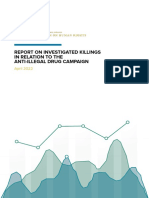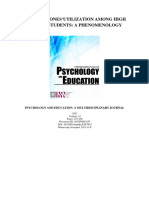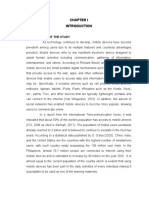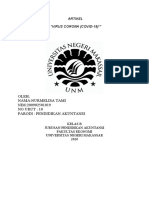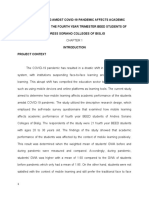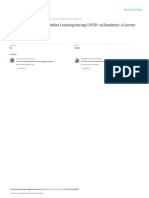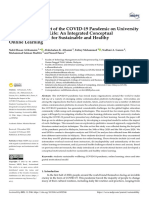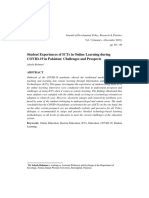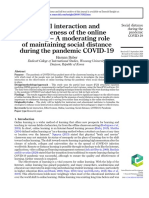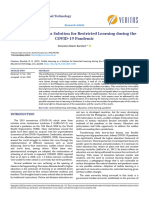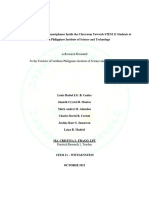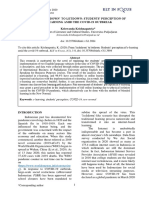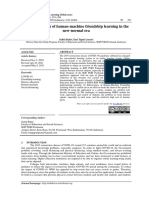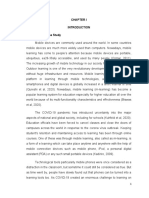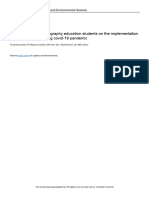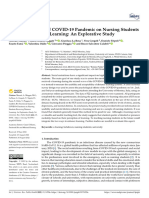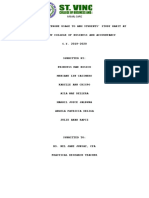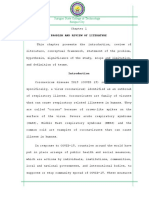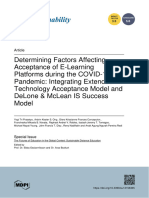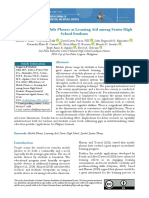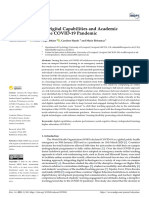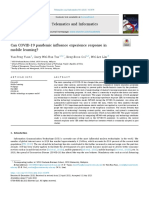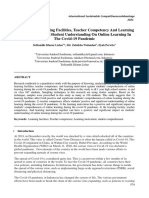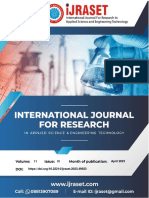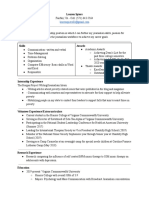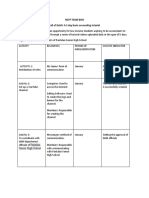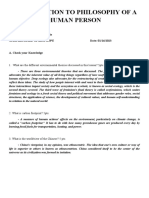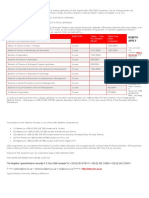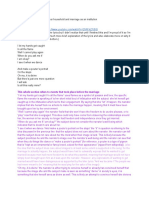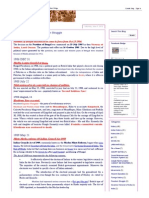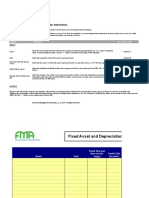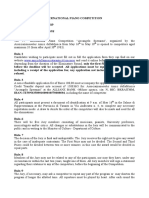Professional Documents
Culture Documents
Mobile Distractions Among Adolescents: Impact On Learning in The Aftermath of COVID-19 in India
Mobile Distractions Among Adolescents: Impact On Learning in The Aftermath of COVID-19 in India
0 ratings0% found this document useful (0 votes)
9 views2 pagesThe advent of mobile technology has brought
numerous benefits, but it has also introduced
distractions, especially among adolescents. The COVID-
19 pandemic further exacerbated this issue, as remote
learning became the norm. This paper explores the
impact of mobile distractions on the learning outcomes
of adolescents in India post-COVID-19.
Original Title
Mobile Distractions among Adolescents: Impact on Learning in the Aftermath of COVID-19 in India
Copyright
© © All Rights Reserved
Available Formats
PDF, TXT or read online from Scribd
Share this document
Did you find this document useful?
Is this content inappropriate?
Report this DocumentThe advent of mobile technology has brought
numerous benefits, but it has also introduced
distractions, especially among adolescents. The COVID-
19 pandemic further exacerbated this issue, as remote
learning became the norm. This paper explores the
impact of mobile distractions on the learning outcomes
of adolescents in India post-COVID-19.
Copyright:
© All Rights Reserved
Available Formats
Download as PDF, TXT or read online from Scribd
0 ratings0% found this document useful (0 votes)
9 views2 pagesMobile Distractions Among Adolescents: Impact On Learning in The Aftermath of COVID-19 in India
Mobile Distractions Among Adolescents: Impact On Learning in The Aftermath of COVID-19 in India
The advent of mobile technology has brought
numerous benefits, but it has also introduced
distractions, especially among adolescents. The COVID-
19 pandemic further exacerbated this issue, as remote
learning became the norm. This paper explores the
impact of mobile distractions on the learning outcomes
of adolescents in India post-COVID-19.
Copyright:
© All Rights Reserved
Available Formats
Download as PDF, TXT or read online from Scribd
You are on page 1of 2
Volume 9, Issue 4, April – 2024 International Journal of Innovative Science and Research Technology
ISSN No:-2456-2165 https://doi.org/10.38124/ijisrt/IJISRT24APR459
Mobile Distractions among Adolescents: Impact on
Learning in the Aftermath of COVID-19 in India
Muniswamy. B. K
Mansarovar Global University
Bhopal, M. P, India
Abstract:- The advent of mobile technology has brought III. METHODOLOGY
numerous benefits, but it has also introduced
distractions, especially among adolescents. The COVID- This paper employs a mixed-methods approach to
19 pandemic further exacerbated this issue, as remote investigate the impact of mobile distractions on adolescent
learning became the norm. This paper explores the learning outcomes in the aftermath of COVID-19 in India.
impact of mobile distractions on the learning outcomes Quantitative data will be collected through surveys
of adolescents in India post-COVID-19. Through a administered to a sample of adolescents, assessing their
review of existing literature and empirical evidence, this mobile usage patterns, academic performance, and perceived
paper aims to shed light on the prevalence of mobile distractions. Qualitative data will be gathered through
distractions, their effects on academic performance, and interviews with educators and parents, providing insights
potential strategies to mitigate them. into the strategies employed to mitigate mobile distractions
and their effectiveness.
I. INTRODUCTION
IV. RESULTS
The widespread availability of mobile devices has
transformed the way individuals communicate, access The findings of this study reveal a significant
information, and engage with the world around them. correlation between mobile distractions and academic
However, the constant connectivity facilitated by mobile performance among adolescents in India. The prevalence of
technology has also led to an increase in distractions, mobile distractions was found to be high, with social media
particularly among adolescents. With the onset of the being the primary source of distraction. Moreover,
COVID-19 pandemic, schools across India shifted to online adolescents reported experiencing difficulties in maintaining
learning, further blurring the boundaries between focus during online classes and completing assignments due
educational and recreational screen time. As a result, to constant interruptions from their mobile devices.
understanding the impact of mobile distractions on the Educators and parents highlighted the need for
learning outcomes of adolescents has become increasingly implementing strategies such as digital detoxes, setting
important. boundaries on screen time, and promoting offline activities
to mitigate mobile distractions effectively.
II. LITERATURE REVIEW
V. DISCUSSION
Numerous studies have documented the detrimental
effects of mobile distractions on cognitive abilities, attention The results of this study underscore the urgent need for
span, and academic performance among adolescents. addressing mobile distractions among adolescents,
Research suggests that excessive use of mobile devices can particularly in the context of online learning post-COVID-
lead to decreased concentration, poor time management 19. While mobile devices offer numerous educational
skills, and increased procrastination. Furthermore, the resources and opportunities for connectivity, their misuse
constant notifications and social media updates bombard can significantly impede academic progress. Collaborative
adolescents with distractions, making it challenging for them efforts between educators, parents, and policymakers are
to focus on their studies. Studies conducted during the essential to develop comprehensive strategies for promoting
COVI”-19 pandemic have highlighted the heightened responsible mobile usage and minimizing distractions in
reliance on mobile devices for both learning and leisure educational settings.
activities, further exacerbating the issue of mobile
distractions. VI. CONCLUSION
In conclusion, mobile distractions pose a significant
challenge to adolescent learning in India, especially in the
wake of the COVID-19 pandemic. By understanding the
underlying factors contributing to mobile distractions and
implementing targeted interventions, stakeholders can foster
an environment conducive to academic success and digital
well-being among adolescents.
IJISRT24APR459 www.ijisrt.com 651
Volume 9, Issue 4, April – 2024 International Journal of Innovative Science and Research Technology
ISSN No:-2456-2165 https://doi.org/10.38124/ijisrt/IJISRT24APR459
REFERENCES
[1]. Anderson, M., & Jiang, J. (2018). Teens, Social Media
& Technology 2018. Pew Research Center.
https://www.pewresearch.org/internet/2018/05/31/teens
-social-media-technology-2018/
[2]. Junco, R. (2015). Student class standing, Facebook
use, and academic performance. Journal of Applied
Developmental Psychology, 36, 18-29.
https://doi.org/10.1016/j.appdev.2014.12.001
[3]. Kuznekoff, J. H., & Titsworth, S. (2013). The impact
of mobile phone usage on student learning.
Communication Education, 62(3), 233-252.
https://doi.org/10.1080/03634523.2013.767917
[4]. Oulasvirta, A., Rattenbury, T., Ma, L., & Raita, E.
(2012). Habits make smartphone use more pervasive.
Personal and Ubiquitous Computing, 16(1), 105-114.
https://doi.org/10.1007/s00779-011-0412-2
[5]. Rideout, V., & Robb, M. B. (2019). The Common
Sense Census: Media Use by Tweens and Teens.
Common Sense Media.
https://www.commonsensemedia.org/research/the-
common-sense-census-media-use-by-tweens-and-
teens-2019
[6]. Zhang, W., & Duan, Y. (2018). The effects of mobile
learning on students’ learning performance: A meta-
analysis. Computers & Education, 128, 45-65.
https://doi.org/10.1016/j.compedu.2018.09.009
[7]. Evans, C., & Brand, J. L. (2022). Mobile phone use
and its impact on academic performance: A systematic
review and meta-analysis. Computers & Education,
175, 104379.
https://doi.org/10.1016/j.compedu.2021.104379
[8]. Lin, L. Y., & Cheng, C. C. (2021). Exploring the
relationship between mobile phone addiction and
academic performance among adolescents during the
COVI”-19 pandemic. Children and Youth Services
Review, 127, 106150.
https://doi.org/10.1016/j.childyouth.2021.106150
[9]. Park, S., & Kang, S. (2020). A study on the effects of
smartphone addiction and parental supervision on
academic achievement in middle school students.
Journal of Korean Academy of Nursing, 50(5), 591-
600. https://doi.org/10.4040/jkan.20140.0506
IJISRT24APR459 www.ijisrt.com 652
You might also like
- Kathleen Jasper - Praxis - PLT - 5622-K - 6Document284 pagesKathleen Jasper - Praxis - PLT - 5622-K - 6Jo Peng100% (1)
- Original HJR 192 June 5 1933Document4 pagesOriginal HJR 192 June 5 1933Daion Marshall100% (9)
- INFJ Profile PDFDocument17 pagesINFJ Profile PDFKa Tim100% (8)
- Armor in The Invasion of North Africa (CGSC N2146.43)Document210 pagesArmor in The Invasion of North Africa (CGSC N2146.43)Paul D Carrier100% (1)
- Report by The Commission On Human Rights On Extrajudicial Killings Under Duterte's War On DrugsDocument58 pagesReport by The Commission On Human Rights On Extrajudicial Killings Under Duterte's War On DrugsRapplerNo ratings yet
- Digital Competence of Bachelor of Physical Education StudentsDocument16 pagesDigital Competence of Bachelor of Physical Education StudentsPsychology and Education: A Multidisciplinary JournalNo ratings yet
- BRM Project SynopsisDocument7 pagesBRM Project SynopsisMounika ReddyNo ratings yet
- The World Is An AppleDocument8 pagesThe World Is An AppleKeiKoNo ratings yet
- Dating The Chedorlaomer's DeathDocument45 pagesDating The Chedorlaomer's DeathScott JacksonNo ratings yet
- COVID-19: Impact on Education and BeyondFrom EverandCOVID-19: Impact on Education and BeyondNivedita Das KunduRating: 2 out of 5 stars2/5 (5)
- Tilopa Project 2 TilatailavajragitDocument12 pagesTilopa Project 2 TilatailavajragitsipossNo ratings yet
- Mobile Phones' Utilization Among High School Students: A PhenomenologyDocument11 pagesMobile Phones' Utilization Among High School Students: A PhenomenologyPsychology and Education: A Multidisciplinary JournalNo ratings yet
- Chapter L: Background of The Study As Technology Continues To Develop, Mobile Devices Have BecomeDocument9 pagesChapter L: Background of The Study As Technology Continues To Develop, Mobile Devices Have Becomeferlyn dumapeNo ratings yet
- Artikel - Nurmelisa Tami - 200902501019Document10 pagesArtikel - Nurmelisa Tami - 200902501019Muh IhsanNo ratings yet
- Pengaruh Media Belajar Smartphone Terhadap Belajar Siswa Di Era Pandemi Covid-19Document13 pagesPengaruh Media Belajar Smartphone Terhadap Belajar Siswa Di Era Pandemi Covid-19TheodoraNo ratings yet
- Digital Dependency A Survey Analysis of Mobile Phone Usage and Its Influence On Academic Performance Among Males and Females in Lahore, PakistanDocument10 pagesDigital Dependency A Survey Analysis of Mobile Phone Usage and Its Influence On Academic Performance Among Males and Females in Lahore, PakistanCheril DRNo ratings yet
- Mobile Learning Amidst CovidDocument9 pagesMobile Learning Amidst CovidJohn Bryan AnajaoNo ratings yet
- 92 TowardstheDevelopmentofaMobileApplicationinMovementCompetencyTrainingGroundedontheUser-CenteredDesignModelTheCaseofaStateUniversityinthePhilippinesDocument13 pages92 TowardstheDevelopmentofaMobileApplicationinMovementCompetencyTrainingGroundedontheUser-CenteredDesignModelTheCaseofaStateUniversityinthePhilippinesGian Carlo LajarcaNo ratings yet
- Students' Perception of Online Learning During COVID-19 PandemicDocument5 pagesStudents' Perception of Online Learning During COVID-19 PandemicPhương QuỳnhNo ratings yet
- Chapter IIDocument5 pagesChapter IIRhosechelle SegarraNo ratings yet
- A Systematic Review of The Benefits and Challenges of Mobile Learning During The COVID19 PandemicDocument14 pagesA Systematic Review of The Benefits and Challenges of Mobile Learning During The COVID19 PandemicCatur Haanii AlfathinNo ratings yet
- Assessment On Lspu-Spcc Students' Readiness Towards M-LearningDocument19 pagesAssessment On Lspu-Spcc Students' Readiness Towards M-LearningijmitNo ratings yet
- GROUP4PRDocument4 pagesGROUP4PRkarldavid5002No ratings yet
- Revised Version of Chapter 1 Group 1 PoofDocument50 pagesRevised Version of Chapter 1 Group 1 PoofandreanadelineNo ratings yet
- Perceived Barriers in The Sudden Transition To Asynchronous and Synchronous Online Distance Learning of Radiologic Technology StudentDocument8 pagesPerceived Barriers in The Sudden Transition To Asynchronous and Synchronous Online Distance Learning of Radiologic Technology StudentIOER International Multidisciplinary Research Journal ( IIMRJ)No ratings yet
- 1415-1436 Olipas Exploring+DifferencesDocument22 pages1415-1436 Olipas Exploring+DifferencesreyeskurtallenNo ratings yet
- Online Learning During Lockdown Period For Covid-19 in IndiaDocument12 pagesOnline Learning During Lockdown Period For Covid-19 in IndiaFozle Rabby 182-11-5893No ratings yet
- Glued On Gadget Buttons: Digital Distraction and Learning MotivationDocument16 pagesGlued On Gadget Buttons: Digital Distraction and Learning MotivationPsychology and Education: A Multidisciplinary JournalNo ratings yet
- A.poblete Influence of Multimedia and Digital Technology On The Behavior of Elementary PupilsDocument13 pagesA.poblete Influence of Multimedia and Digital Technology On The Behavior of Elementary Pupilsronald bantuganNo ratings yet
- Sustainability 13 02546 v2Document20 pagesSustainability 13 02546 v2Ajay LakshmananNo ratings yet
- Student Experiences of ICTs in Online Learning During COVID-19 in Pakistan: Challenges and ProspectsDocument13 pagesStudent Experiences of ICTs in Online Learning During COVID-19 in Pakistan: Challenges and ProspectsJournal of Development Policy, Research & PracticeNo ratings yet
- Students Perception of Mobile Learning During Covid 19 in Bangladesh University Student Perspective 8443Document10 pagesStudents Perception of Mobile Learning During Covid 19 in Bangladesh University Student Perspective 8443Mimi KartikaNo ratings yet
- Social InteractionDocument13 pagesSocial InteractionMayd SatumcacalNo ratings yet
- Understanding The Impact of Covid-19 On Education Symbiosis Law School, PuneDocument26 pagesUnderstanding The Impact of Covid-19 On Education Symbiosis Law School, PuneSrijan NetiNo ratings yet
- Mobile Learning As A Solution For Restricted Learning During The Covid 19 Pandemic 11584Document7 pagesMobile Learning As A Solution For Restricted Learning During The Covid 19 Pandemic 11584Jay A. PogosaNo ratings yet
- Manuscript-Group 10Document8 pagesManuscript-Group 10crimson4282006No ratings yet
- Chapter 1 To 5Document73 pagesChapter 1 To 5Richie Tagao TumaliuanNo ratings yet
- From Lockdown' To Letdown: Students' Perception of E-Learning Amid The Covid-19 Outbreak Kriswanda KrishnapatriaDocument8 pagesFrom Lockdown' To Letdown: Students' Perception of E-Learning Amid The Covid-19 Outbreak Kriswanda Krishnapatriaenne zacariasNo ratings yet
- Implementation of Human-Machine Friendship Learning in The New-Normal EraDocument6 pagesImplementation of Human-Machine Friendship Learning in The New-Normal EraJournal of Education and LearningNo ratings yet
- Impact of E Learning On Higher EducationDocument5 pagesImpact of E Learning On Higher EducationFong King YapNo ratings yet
- International Journal of Trend in Scientific Research and Development (IJTSRD)Document8 pagesInternational Journal of Trend in Scientific Research and Development (IJTSRD)Editor IJTSRDNo ratings yet
- Alternative Remote Learning Habits of Junior High School Students of ARMM Regional Science High School Brought by Covid-19Document6 pagesAlternative Remote Learning Habits of Junior High School Students of ARMM Regional Science High School Brought by Covid-19Psychology and Education: A Multidisciplinary JournalNo ratings yet
- 1 ORIGINAL But TITLE FORMAT Needs To Be CorrectedDocument11 pages1 ORIGINAL But TITLE FORMAT Needs To Be CorrectedRitz DurmiendoNo ratings yet
- Problematic Social Media UseDocument25 pagesProblematic Social Media Useapi-618288688No ratings yet
- IKIP Siliwangi Student's Perceptions of Online Teaching and Learning Process During COVID-19 Pandemic?Document7 pagesIKIP Siliwangi Student's Perceptions of Online Teaching and Learning Process During COVID-19 Pandemic?Won YudingzNo ratings yet
- CHAPTER 1 To Five - ResearchDocument57 pagesCHAPTER 1 To Five - ResearchLyra Jean MesaNo ratings yet
- The Perspective of Geography Education Students OnDocument10 pagesThe Perspective of Geography Education Students On09. Nguyễn Mỹ HậuNo ratings yet
- Ijerph 19 10556 v2Document10 pagesIjerph 19 10556 v2franceseunyNo ratings yet
- Chapter I Smart PhoneDocument11 pagesChapter I Smart Phoneprincess bosicoNo ratings yet
- Problem and Review of Literature This Chapter Presents The Introduction, Review ofDocument32 pagesProblem and Review of Literature This Chapter Presents The Introduction, Review ofDexter Dave CagampangNo ratings yet
- The Development of Smartphones and Its Implications To The Teaching-Learning ProcessDocument7 pagesThe Development of Smartphones and Its Implications To The Teaching-Learning ProcessAlthea LopezNo ratings yet
- HkjssDocument9 pagesHkjssRanta butarbutarNo ratings yet
- Ijsms V6i3p111Document8 pagesIjsms V6i3p111Ritz DurmiendoNo ratings yet
- A Qualitative Exploration of Teachers ' Perspective On Smartphones Usage in Higher Education in Developing CountriesDocument16 pagesA Qualitative Exploration of Teachers ' Perspective On Smartphones Usage in Higher Education in Developing CountriesirishddNo ratings yet
- Asdadasd HHHHFFRFFUUDocument14 pagesAsdadasd HHHHFFRFFUUAkira KurusuNo ratings yet
- Mobile Empowerment: Enhancing Education and Connectivity For College StudentsDocument7 pagesMobile Empowerment: Enhancing Education and Connectivity For College StudentsIJELS Research JournalNo ratings yet
- Mobile Learning Action Research FINAL 2Document23 pagesMobile Learning Action Research FINAL 2Jonaida LauretaNo ratings yet
- Determining Factors Affecting Acceptance of E-Learning Platforms During The COVID-19 Pandemic: Integrating Extended Technology Acceptance Model and DeLone & McLean IS Success ModelDocument17 pagesDetermining Factors Affecting Acceptance of E-Learning Platforms During The COVID-19 Pandemic: Integrating Extended Technology Acceptance Model and DeLone & McLean IS Success ModelYulong WangNo ratings yet
- European Journal of Theoretical and Applied SciencesDocument13 pagesEuropean Journal of Theoretical and Applied SciencesEJTAS journalNo ratings yet
- Education 11 00361Document15 pagesEducation 11 00361Maria Cielo Mantillo LucinoNo ratings yet
- Thesis Final Group 5 3Document17 pagesThesis Final Group 5 3PILLOS, LEA JOY C.No ratings yet
- Chapter 2Document4 pagesChapter 2jairos pedrosaNo ratings yet
- Telematics and Informatics: Yun-Peng Yuan, Garry Wei-Han Tan, Keng-Boon Ooi, Wei-Lee LimDocument14 pagesTelematics and Informatics: Yun-Peng Yuan, Garry Wei-Han Tan, Keng-Boon Ooi, Wei-Lee LimAgita Intan MahiraNo ratings yet
- College of Nursing: Our Lady of Fatima UniversityDocument7 pagesCollege of Nursing: Our Lady of Fatima UniversityJanaica JuanNo ratings yet
- A Symbolic Interactionist Study On Online Learning of Grade 12 STEMDocument19 pagesA Symbolic Interactionist Study On Online Learning of Grade 12 STEMMa. Sharlyn NaviaNo ratings yet
- The Effect of Learning Facilities, Teacher Competency and Learning Motivation of The Student Understanding On Online Learning in The Covid-19 PandemicDocument12 pagesThe Effect of Learning Facilities, Teacher Competency and Learning Motivation of The Student Understanding On Online Learning in The Covid-19 PandemicTunggal RiyantiNo ratings yet
- Impact of COVID-19 in Education SectorDocument9 pagesImpact of COVID-19 in Education SectorIJRASETPublicationsNo ratings yet
- Assessment of Integrated Poultry Manure and Synthetic Fertilizer Effects on Maize (Zea mays) Growth and Soil Properties: A Study from Bayero University, KanoDocument15 pagesAssessment of Integrated Poultry Manure and Synthetic Fertilizer Effects on Maize (Zea mays) Growth and Soil Properties: A Study from Bayero University, KanoInternational Journal of Innovative Science and Research Technology100% (1)
- Seasonal Variation and Distribution Patterns of Endophytic Community in Withania SomniferaDocument7 pagesSeasonal Variation and Distribution Patterns of Endophytic Community in Withania SomniferaInternational Journal of Innovative Science and Research TechnologyNo ratings yet
- Utilizing Chicken Eggshells and Waste Glass Powder as Cement Fillers for Environmental StabilityDocument6 pagesUtilizing Chicken Eggshells and Waste Glass Powder as Cement Fillers for Environmental StabilityInternational Journal of Innovative Science and Research TechnologyNo ratings yet
- Personal Capabilities of The Non-Teaching Personnel and Client SatisfactionDocument8 pagesPersonal Capabilities of The Non-Teaching Personnel and Client SatisfactionInternational Journal of Innovative Science and Research TechnologyNo ratings yet
- Transforming Challenges to Victories: An Inquiry on Transformational Leadership of School Leaders in the Public Elementary SchoolsDocument54 pagesTransforming Challenges to Victories: An Inquiry on Transformational Leadership of School Leaders in the Public Elementary SchoolsInternational Journal of Innovative Science and Research TechnologyNo ratings yet
- The Influence of Continuance Commitment on Job Satisfaction of Barangay Health Workers in Malaybalay City, BukidnonDocument14 pagesThe Influence of Continuance Commitment on Job Satisfaction of Barangay Health Workers in Malaybalay City, BukidnonInternational Journal of Innovative Science and Research TechnologyNo ratings yet
- Intelligent Clinical Documentation: Harnessing Generative AI For Patient-Centric Clinical Note GenerationDocument15 pagesIntelligent Clinical Documentation: Harnessing Generative AI For Patient-Centric Clinical Note GenerationInternational Journal of Innovative Science and Research TechnologyNo ratings yet
- Exploring The Potential Advantages of Traditional Therapies in Autoimmune Blistering Illnesses: A Comprehensive Review and Analysis, ResearchDocument12 pagesExploring The Potential Advantages of Traditional Therapies in Autoimmune Blistering Illnesses: A Comprehensive Review and Analysis, ResearchInternational Journal of Innovative Science and Research TechnologyNo ratings yet
- Meta Land: Redefining Virtual Communities Through Centralized Governance, Inclusivity and InnovationDocument5 pagesMeta Land: Redefining Virtual Communities Through Centralized Governance, Inclusivity and InnovationInternational Journal of Innovative Science and Research TechnologyNo ratings yet
- Solar Based Multilevel Inverter F o R BLDC Motor DriveDocument8 pagesSolar Based Multilevel Inverter F o R BLDC Motor DriveInternational Journal of Innovative Science and Research TechnologyNo ratings yet
- Skin Disease Detection and Remedial SystemDocument7 pagesSkin Disease Detection and Remedial SystemInternational Journal of Innovative Science and Research TechnologyNo ratings yet
- Design and Development of Multi-Featured Medical StretcherDocument4 pagesDesign and Development of Multi-Featured Medical StretcherInternational Journal of Innovative Science and Research TechnologyNo ratings yet
- EmoConnect: Nurturing Trust and Relationship Bonds in Alzheimer's ConversationsDocument3 pagesEmoConnect: Nurturing Trust and Relationship Bonds in Alzheimer's ConversationsInternational Journal of Innovative Science and Research TechnologyNo ratings yet
- Unlocking Sentiments: Enhancing IOCL Petrol Pump ExperiencesDocument8 pagesUnlocking Sentiments: Enhancing IOCL Petrol Pump ExperiencesInternational Journal of Innovative Science and Research TechnologyNo ratings yet
- Smart and Secure Home With ChatbotDocument9 pagesSmart and Secure Home With ChatbotInternational Journal of Innovative Science and Research TechnologyNo ratings yet
- Preparation and Identification of Magnetic Iron Nanoparticle Based On A Natural Hydrogel and Its Performance in Targeted Drug DeliveryDocument17 pagesPreparation and Identification of Magnetic Iron Nanoparticle Based On A Natural Hydrogel and Its Performance in Targeted Drug DeliveryInternational Journal of Innovative Science and Research TechnologyNo ratings yet
- Development of Smart Ground Fault Location Model For Radial Distribution SystemDocument14 pagesDevelopment of Smart Ground Fault Location Model For Radial Distribution SystemInternational Journal of Innovative Science and Research TechnologyNo ratings yet
- Fall Detection and Boundary Detection in Care HomesDocument7 pagesFall Detection and Boundary Detection in Care HomesInternational Journal of Innovative Science and Research TechnologyNo ratings yet
- Application of Plant Growth Promoting Rhizobacteria On Vegetative Growth in Chili Plants (Capsicum Frutescens L.)Document7 pagesApplication of Plant Growth Promoting Rhizobacteria On Vegetative Growth in Chili Plants (Capsicum Frutescens L.)International Journal of Innovative Science and Research TechnologyNo ratings yet
- Exploring The Post-Annealing Influence On Stannous Oxide Thin Films Via Chemical Bath Deposition Technique: Unveiling Structural, Optical, and Electrical DynamicsDocument7 pagesExploring The Post-Annealing Influence On Stannous Oxide Thin Films Via Chemical Bath Deposition Technique: Unveiling Structural, Optical, and Electrical DynamicsInternational Journal of Innovative Science and Research TechnologyNo ratings yet
- Reading Intervention Through "Brigada Sa Pagbasa": Viewpoint of Primary Grade TeachersDocument3 pagesReading Intervention Through "Brigada Sa Pagbasa": Viewpoint of Primary Grade TeachersInternational Journal of Innovative Science and Research TechnologyNo ratings yet
- Firm Size As A Mediator Between Inventory Management Andperformance of Nigerian CompaniesDocument8 pagesFirm Size As A Mediator Between Inventory Management Andperformance of Nigerian CompaniesInternational Journal of Innovative Science and Research TechnologyNo ratings yet
- Application of Game Theory in Solving Urban Water Challenges in Ibadan-North Local Government Area, Oyo State, NigeriaDocument9 pagesApplication of Game Theory in Solving Urban Water Challenges in Ibadan-North Local Government Area, Oyo State, NigeriaInternational Journal of Innovative Science and Research TechnologyNo ratings yet
- Global Warming Reduction Proposal AssessmentDocument6 pagesGlobal Warming Reduction Proposal AssessmentInternational Journal of Innovative Science and Research TechnologyNo ratings yet
- On The Development of A Threat Driven Model For Campus NetworkDocument14 pagesOn The Development of A Threat Driven Model For Campus NetworkInternational Journal of Innovative Science and Research TechnologyNo ratings yet
- Detection of Phishing WebsitesDocument6 pagesDetection of Phishing WebsitesInternational Journal of Innovative Science and Research TechnologyNo ratings yet
- A Study To Assess The Knowledge Regarding Teratogens Among The Husbands of Antenatal Mother Visiting Obstetrics and Gynecology OPD of Sharda Hospital, Greater Noida, UpDocument5 pagesA Study To Assess The Knowledge Regarding Teratogens Among The Husbands of Antenatal Mother Visiting Obstetrics and Gynecology OPD of Sharda Hospital, Greater Noida, UpInternational Journal of Innovative Science and Research TechnologyNo ratings yet
- PHREEQ C Modelling Tool Application To Determine The Effect of Anions On Speciation of Selected Metals in Water Systems Within Kajiado North Constituency in KenyaDocument71 pagesPHREEQ C Modelling Tool Application To Determine The Effect of Anions On Speciation of Selected Metals in Water Systems Within Kajiado North Constituency in KenyaInternational Journal of Innovative Science and Research TechnologyNo ratings yet
- Mandibular Mass Revealing Vesicular Thyroid Carcinoma A Case ReportDocument5 pagesMandibular Mass Revealing Vesicular Thyroid Carcinoma A Case ReportInternational Journal of Innovative Science and Research TechnologyNo ratings yet
- Esophageal Melanoma - A Rare NeoplasmDocument3 pagesEsophageal Melanoma - A Rare NeoplasmInternational Journal of Innovative Science and Research TechnologyNo ratings yet
- Wiley Chapter 9 Inventories Additional Valuation IssuesDocument20 pagesWiley Chapter 9 Inventories Additional Valuation IssuesGriselda AyuNo ratings yet
- Lauren Spiers Resume-9Document1 pageLauren Spiers Resume-9Lauren SpiersNo ratings yet
- NSTP Community Service Activity PlanDocument3 pagesNSTP Community Service Activity PlanLoydifer ..No ratings yet
- Module 4 Introduction To The Philosophy of A Human PersonDocument3 pagesModule 4 Introduction To The Philosophy of A Human PersonReyman Andrade LosanoNo ratings yet
- Umu Application GuideDocument2 pagesUmu Application GuideMuyaeti Joseph IsaacNo ratings yet
- Amit ManochaDocument3 pagesAmit Manochapeter samuelNo ratings yet
- NaveenDocument3 pagesNaveenKalyan KumarNo ratings yet
- The Annoying Fortune TellerDocument5 pagesThe Annoying Fortune TellerCristian VeraNo ratings yet
- 1916 by Cake Bake Betty Lyric AnalysisDocument6 pages1916 by Cake Bake Betty Lyric AnalysischibichubbyenjoyerNo ratings yet
- Chapters 1-11 Comprehension Assessment KeyDocument3 pagesChapters 1-11 Comprehension Assessment Keyapi-254598695No ratings yet
- 187th Infantry Brigade (United States), American Army, Order of BattleDocument3 pages187th Infantry Brigade (United States), American Army, Order of BattlepcojediNo ratings yet
- Indian History - Chronology of India's Freedom StruggleDocument16 pagesIndian History - Chronology of India's Freedom StrugglemsmgectNo ratings yet
- Accounting Ratios PDFDocument22 pagesAccounting Ratios PDFumerceoNo ratings yet
- Street Maps and Other Maps EU InstitutionsDocument14 pagesStreet Maps and Other Maps EU InstitutionsFederico PratellesiNo ratings yet
- Fixed Asset and Depreciation ScheduleDocument5 pagesFixed Asset and Depreciation ScheduleDarkchild HeavensNo ratings yet
- Apple Iphone SWOTDocument20 pagesApple Iphone SWOTericdbrittoNo ratings yet
- Asiya MudniDocument3 pagesAsiya MudnimaxNo ratings yet
- STEM English NotesDocument7 pagesSTEM English Notesderek chuNo ratings yet
- Impact of E-Logistics in Customer SatisfactionDocument1 pageImpact of E-Logistics in Customer SatisfactionPerumal DMNo ratings yet
- Daily Lesson Log Catch Up FridayDocument4 pagesDaily Lesson Log Catch Up Fridayrazel.estiagaNo ratings yet
- WWW - Amicidellamusicataranto.it/concorso: TH TH THDocument4 pagesWWW - Amicidellamusicataranto.it/concorso: TH TH THANdreasNo ratings yet
- Better Call Saul Subtitle - MijoDocument44 pagesBetter Call Saul Subtitle - MijoVishweshwaran MNo ratings yet




